Psychology Essay: Planning for Children's Learning Socio-Culturally
VerifiedAdded on 2023/04/22
|7
|1561
|281
Essay
AI Summary
This essay discusses the importance of various components in planning for children's learning from a socio-cultural perspective, emphasizing the role of society in a child's development. It highlights the significance of formal and informal observation to understand a child's learning ability and development, suggesting the mosaic approach for formal observation based on Vygotsky's theory. The essay also covers the importance of analyzing and interpreting observation data through assessment, including documenting children’s learning and using techniques from Reggio Emilia schools. Furthermore, it emphasizes the role of planning in developing effective learning strategies based on the child's specific interests and needs, and the importance of evaluating the learning plan to determine its effectiveness and plan for future improvements. Desklib offers a wealth of similar solved assignments and resources for students.
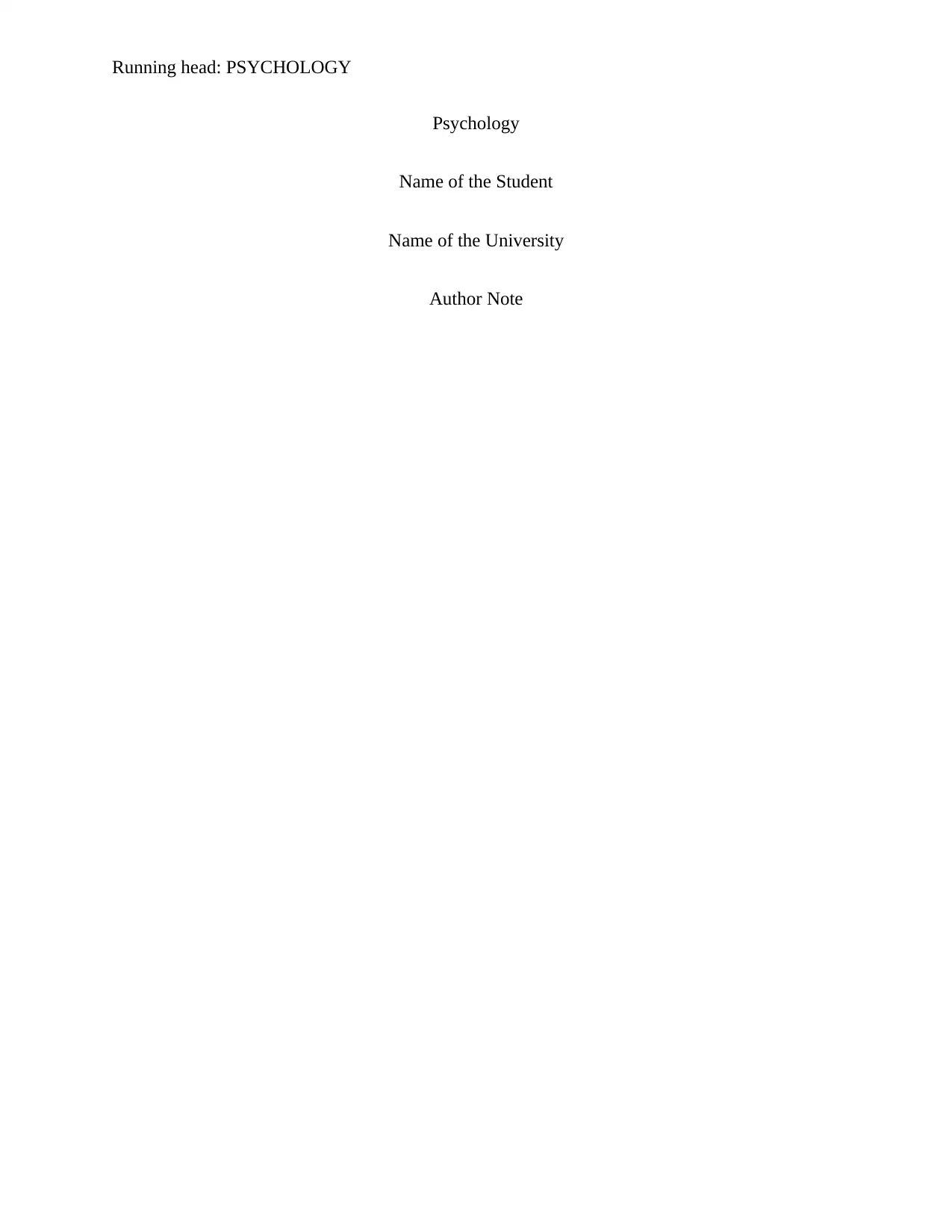
Running head: PSYCHOLOGY
Psychology
Name of the Student
Name of the University
Author Note
Psychology
Name of the Student
Name of the University
Author Note
Paraphrase This Document
Need a fresh take? Get an instant paraphrase of this document with our AI Paraphraser
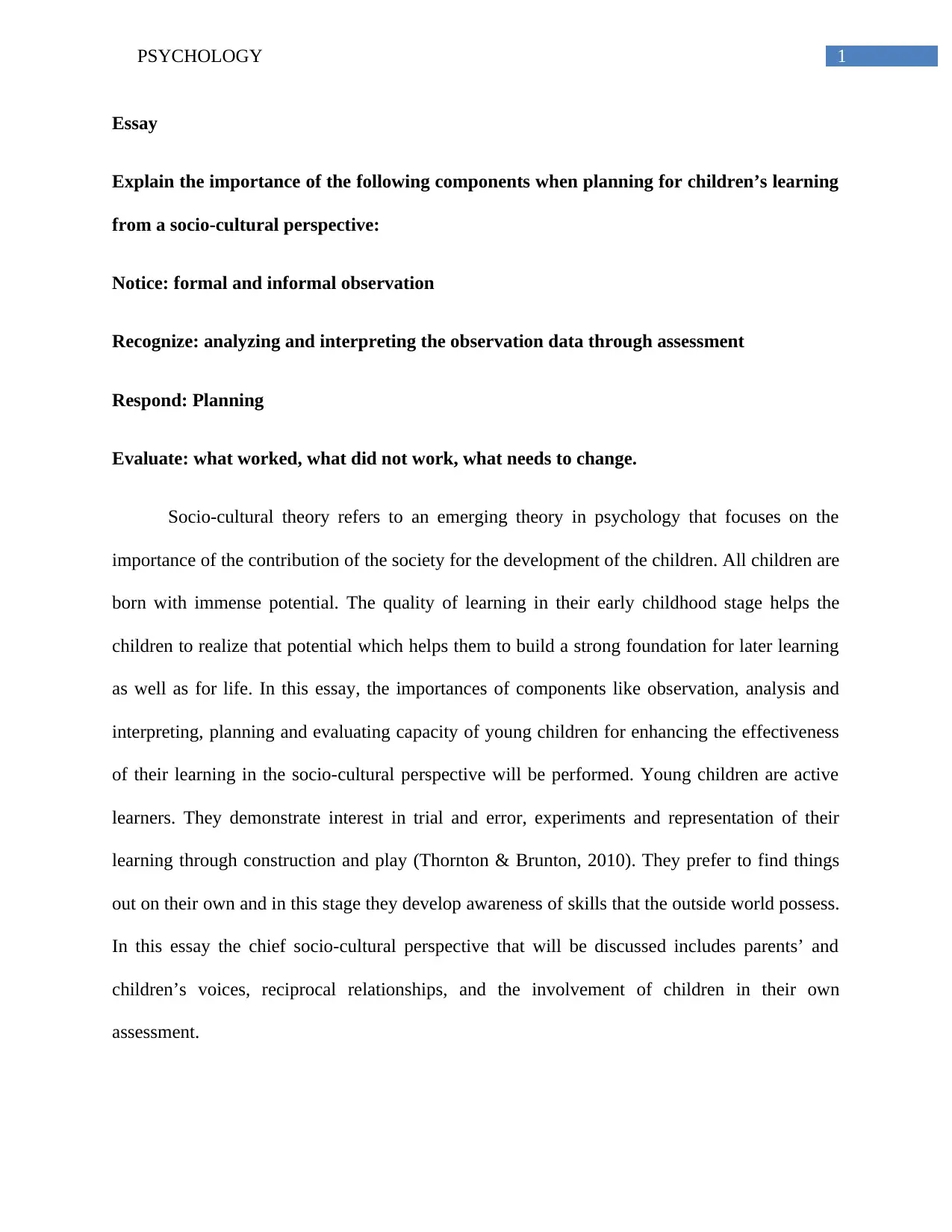
1PSYCHOLOGY
Essay
Explain the importance of the following components when planning for children’s learning
from a socio-cultural perspective:
Notice: formal and informal observation
Recognize: analyzing and interpreting the observation data through assessment
Respond: Planning
Evaluate: what worked, what did not work, what needs to change.
Socio-cultural theory refers to an emerging theory in psychology that focuses on the
importance of the contribution of the society for the development of the children. All children are
born with immense potential. The quality of learning in their early childhood stage helps the
children to realize that potential which helps them to build a strong foundation for later learning
as well as for life. In this essay, the importances of components like observation, analysis and
interpreting, planning and evaluating capacity of young children for enhancing the effectiveness
of their learning in the socio-cultural perspective will be performed. Young children are active
learners. They demonstrate interest in trial and error, experiments and representation of their
learning through construction and play (Thornton & Brunton, 2010). They prefer to find things
out on their own and in this stage they develop awareness of skills that the outside world possess.
In this essay the chief socio-cultural perspective that will be discussed includes parents’ and
children’s voices, reciprocal relationships, and the involvement of children in their own
assessment.
Essay
Explain the importance of the following components when planning for children’s learning
from a socio-cultural perspective:
Notice: formal and informal observation
Recognize: analyzing and interpreting the observation data through assessment
Respond: Planning
Evaluate: what worked, what did not work, what needs to change.
Socio-cultural theory refers to an emerging theory in psychology that focuses on the
importance of the contribution of the society for the development of the children. All children are
born with immense potential. The quality of learning in their early childhood stage helps the
children to realize that potential which helps them to build a strong foundation for later learning
as well as for life. In this essay, the importances of components like observation, analysis and
interpreting, planning and evaluating capacity of young children for enhancing the effectiveness
of their learning in the socio-cultural perspective will be performed. Young children are active
learners. They demonstrate interest in trial and error, experiments and representation of their
learning through construction and play (Thornton & Brunton, 2010). They prefer to find things
out on their own and in this stage they develop awareness of skills that the outside world possess.
In this essay the chief socio-cultural perspective that will be discussed includes parents’ and
children’s voices, reciprocal relationships, and the involvement of children in their own
assessment.
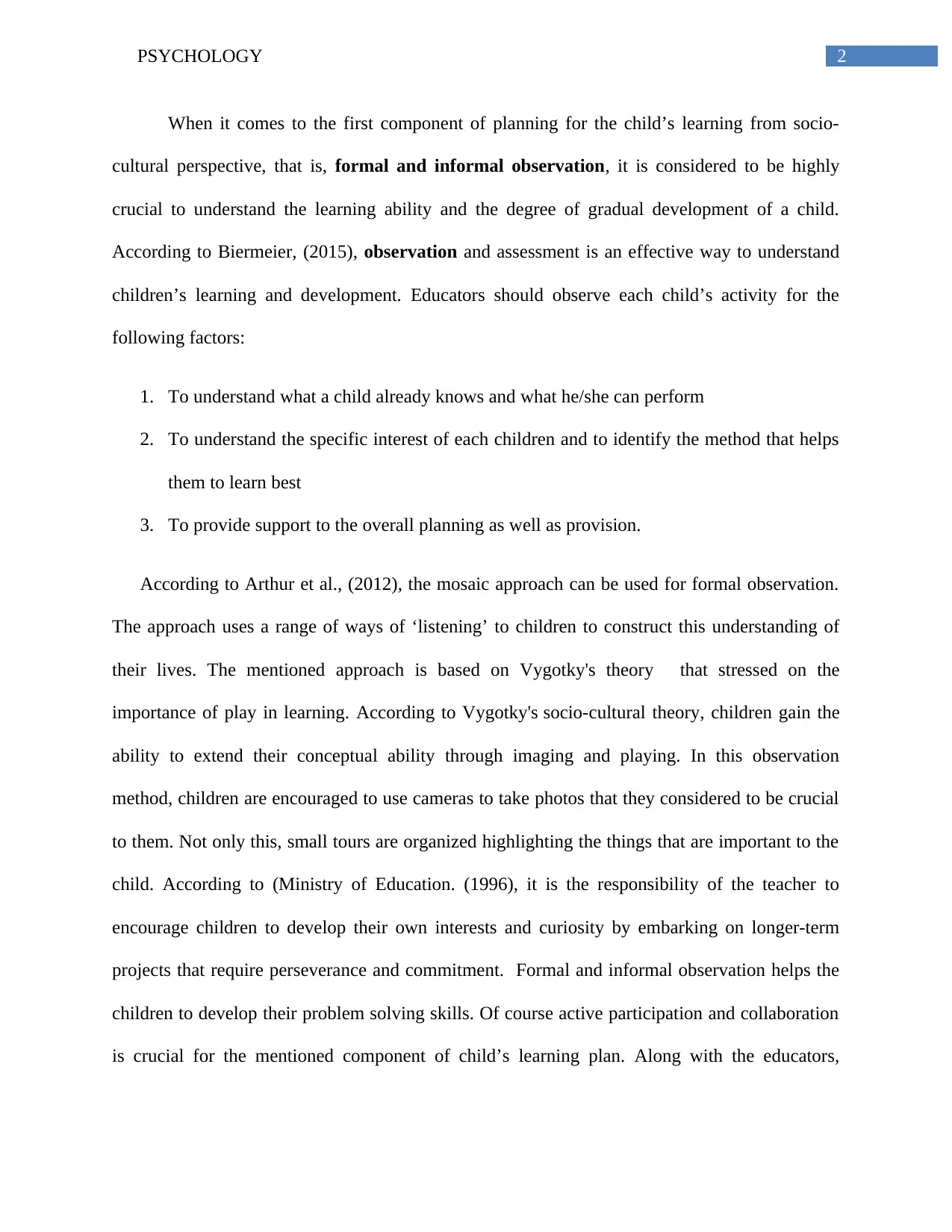
2PSYCHOLOGY
When it comes to the first component of planning for the child’s learning from socio-
cultural perspective, that is, formal and informal observation, it is considered to be highly
crucial to understand the learning ability and the degree of gradual development of a child.
According to Biermeier, (2015), observation and assessment is an effective way to understand
children’s learning and development. Educators should observe each child’s activity for the
following factors:
1. To understand what a child already knows and what he/she can perform
2. To understand the specific interest of each children and to identify the method that helps
them to learn best
3. To provide support to the overall planning as well as provision.
According to Arthur et al., (2012), the mosaic approach can be used for formal observation.
The approach uses a range of ways of ‘listening’ to children to construct this understanding of
their lives. The mentioned approach is based on Vygotky's theory that stressed on the
importance of play in learning. According to Vygotky's socio-cultural theory, children gain the
ability to extend their conceptual ability through imaging and playing. In this observation
method, children are encouraged to use cameras to take photos that they considered to be crucial
to them. Not only this, small tours are organized highlighting the things that are important to the
child. According to (Ministry of Education. (1996), it is the responsibility of the teacher to
encourage children to develop their own interests and curiosity by embarking on longer-term
projects that require perseverance and commitment. Formal and informal observation helps the
children to develop their problem solving skills. Of course active participation and collaboration
is crucial for the mentioned component of child’s learning plan. Along with the educators,
When it comes to the first component of planning for the child’s learning from socio-
cultural perspective, that is, formal and informal observation, it is considered to be highly
crucial to understand the learning ability and the degree of gradual development of a child.
According to Biermeier, (2015), observation and assessment is an effective way to understand
children’s learning and development. Educators should observe each child’s activity for the
following factors:
1. To understand what a child already knows and what he/she can perform
2. To understand the specific interest of each children and to identify the method that helps
them to learn best
3. To provide support to the overall planning as well as provision.
According to Arthur et al., (2012), the mosaic approach can be used for formal observation.
The approach uses a range of ways of ‘listening’ to children to construct this understanding of
their lives. The mentioned approach is based on Vygotky's theory that stressed on the
importance of play in learning. According to Vygotky's socio-cultural theory, children gain the
ability to extend their conceptual ability through imaging and playing. In this observation
method, children are encouraged to use cameras to take photos that they considered to be crucial
to them. Not only this, small tours are organized highlighting the things that are important to the
child. According to (Ministry of Education. (1996), it is the responsibility of the teacher to
encourage children to develop their own interests and curiosity by embarking on longer-term
projects that require perseverance and commitment. Formal and informal observation helps the
children to develop their problem solving skills. Of course active participation and collaboration
is crucial for the mentioned component of child’s learning plan. Along with the educators,
⊘ This is a preview!⊘
Do you want full access?
Subscribe today to unlock all pages.

Trusted by 1+ million students worldwide
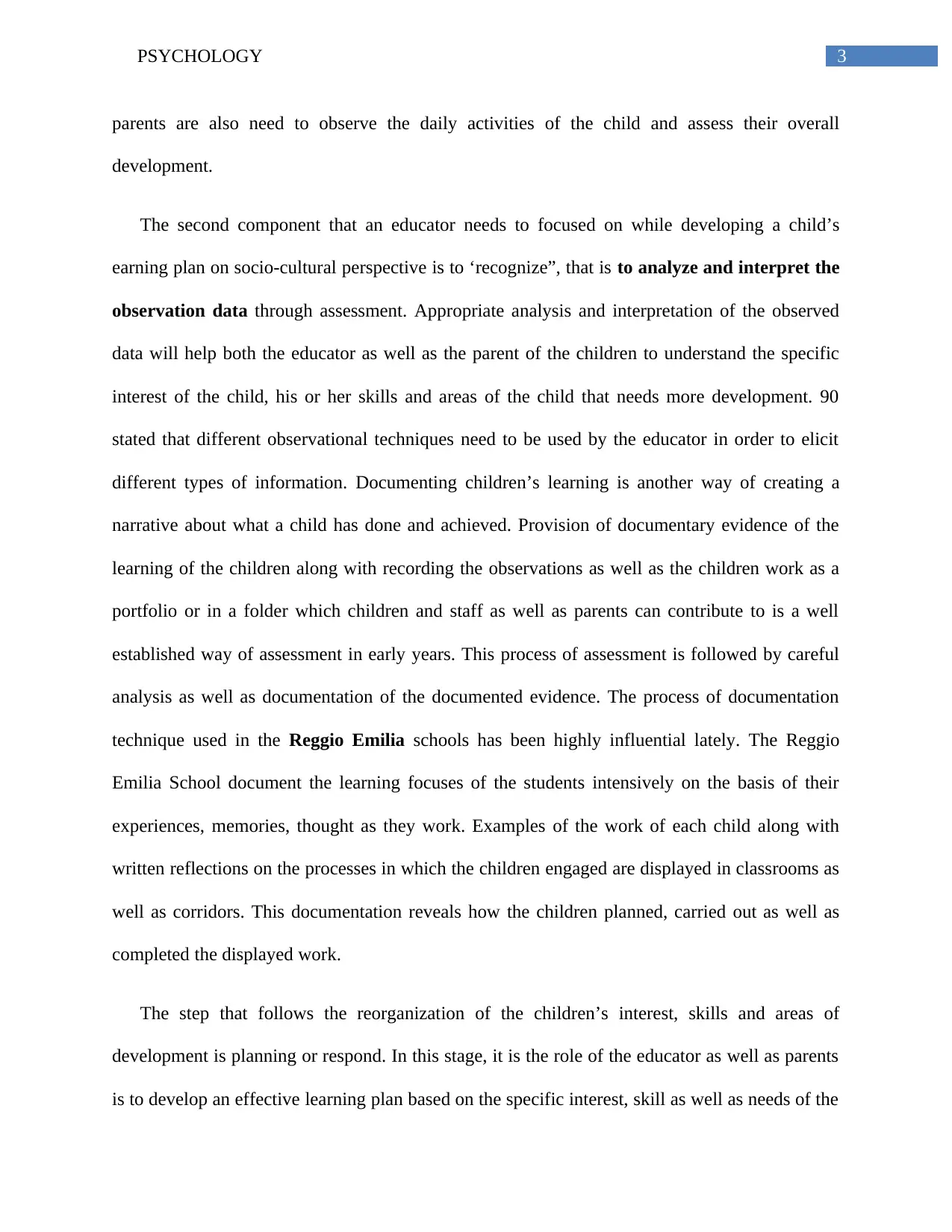
3PSYCHOLOGY
parents are also need to observe the daily activities of the child and assess their overall
development.
The second component that an educator needs to focused on while developing a child’s
earning plan on socio-cultural perspective is to ‘recognize”, that is to analyze and interpret the
observation data through assessment. Appropriate analysis and interpretation of the observed
data will help both the educator as well as the parent of the children to understand the specific
interest of the child, his or her skills and areas of the child that needs more development. 90
stated that different observational techniques need to be used by the educator in order to elicit
different types of information. Documenting children’s learning is another way of creating a
narrative about what a child has done and achieved. Provision of documentary evidence of the
learning of the children along with recording the observations as well as the children work as a
portfolio or in a folder which children and staff as well as parents can contribute to is a well
established way of assessment in early years. This process of assessment is followed by careful
analysis as well as documentation of the documented evidence. The process of documentation
technique used in the Reggio Emilia schools has been highly influential lately. The Reggio
Emilia School document the learning focuses of the students intensively on the basis of their
experiences, memories, thought as they work. Examples of the work of each child along with
written reflections on the processes in which the children engaged are displayed in classrooms as
well as corridors. This documentation reveals how the children planned, carried out as well as
completed the displayed work.
The step that follows the reorganization of the children’s interest, skills and areas of
development is planning or respond. In this stage, it is the role of the educator as well as parents
is to develop an effective learning plan based on the specific interest, skill as well as needs of the
parents are also need to observe the daily activities of the child and assess their overall
development.
The second component that an educator needs to focused on while developing a child’s
earning plan on socio-cultural perspective is to ‘recognize”, that is to analyze and interpret the
observation data through assessment. Appropriate analysis and interpretation of the observed
data will help both the educator as well as the parent of the children to understand the specific
interest of the child, his or her skills and areas of the child that needs more development. 90
stated that different observational techniques need to be used by the educator in order to elicit
different types of information. Documenting children’s learning is another way of creating a
narrative about what a child has done and achieved. Provision of documentary evidence of the
learning of the children along with recording the observations as well as the children work as a
portfolio or in a folder which children and staff as well as parents can contribute to is a well
established way of assessment in early years. This process of assessment is followed by careful
analysis as well as documentation of the documented evidence. The process of documentation
technique used in the Reggio Emilia schools has been highly influential lately. The Reggio
Emilia School document the learning focuses of the students intensively on the basis of their
experiences, memories, thought as they work. Examples of the work of each child along with
written reflections on the processes in which the children engaged are displayed in classrooms as
well as corridors. This documentation reveals how the children planned, carried out as well as
completed the displayed work.
The step that follows the reorganization of the children’s interest, skills and areas of
development is planning or respond. In this stage, it is the role of the educator as well as parents
is to develop an effective learning plan based on the specific interest, skill as well as needs of the
Paraphrase This Document
Need a fresh take? Get an instant paraphrase of this document with our AI Paraphraser
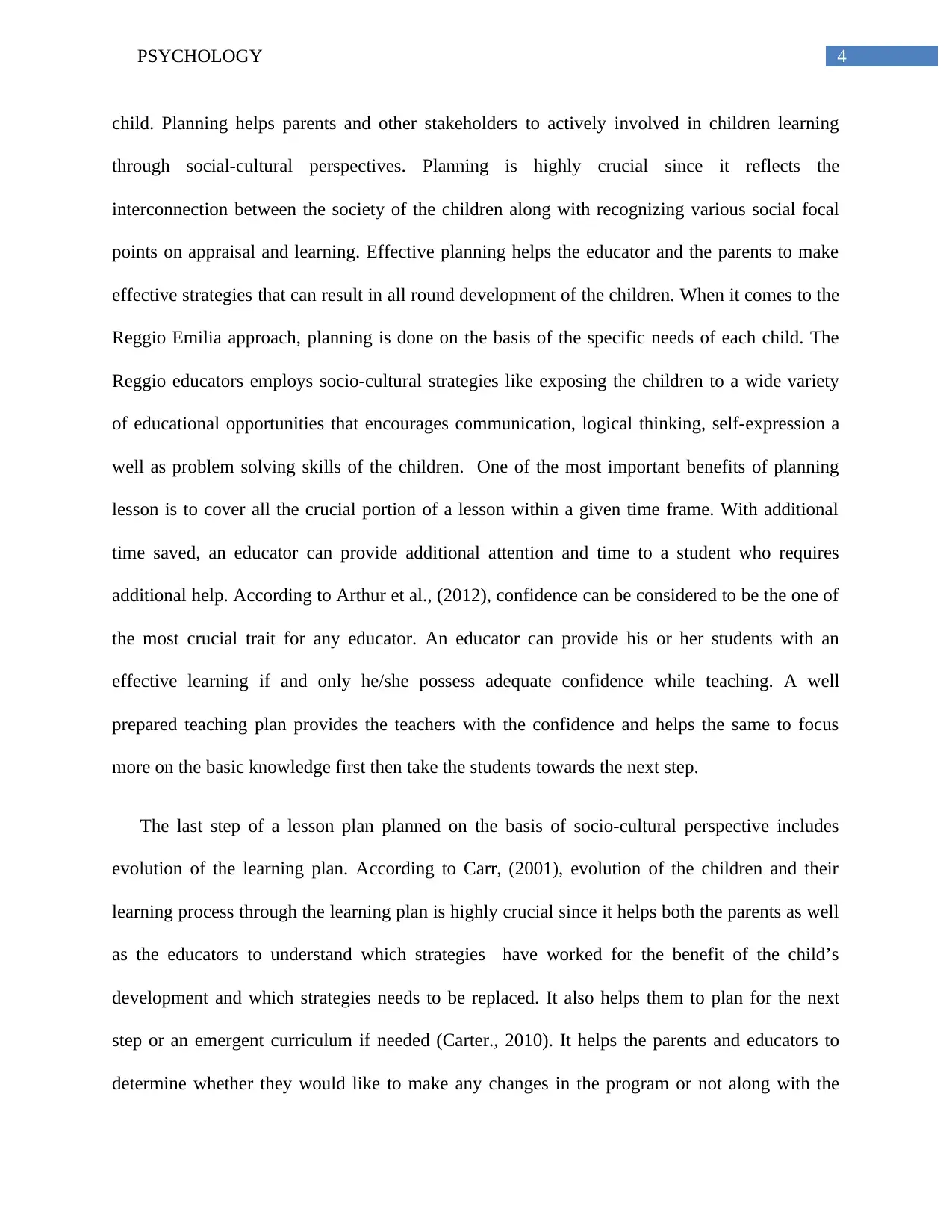
4PSYCHOLOGY
child. Planning helps parents and other stakeholders to actively involved in children learning
through social-cultural perspectives. Planning is highly crucial since it reflects the
interconnection between the society of the children along with recognizing various social focal
points on appraisal and learning. Effective planning helps the educator and the parents to make
effective strategies that can result in all round development of the children. When it comes to the
Reggio Emilia approach, planning is done on the basis of the specific needs of each child. The
Reggio educators employs socio-cultural strategies like exposing the children to a wide variety
of educational opportunities that encourages communication, logical thinking, self-expression a
well as problem solving skills of the children. One of the most important benefits of planning
lesson is to cover all the crucial portion of a lesson within a given time frame. With additional
time saved, an educator can provide additional attention and time to a student who requires
additional help. According to Arthur et al., (2012), confidence can be considered to be the one of
the most crucial trait for any educator. An educator can provide his or her students with an
effective learning if and only he/she possess adequate confidence while teaching. A well
prepared teaching plan provides the teachers with the confidence and helps the same to focus
more on the basic knowledge first then take the students towards the next step.
The last step of a lesson plan planned on the basis of socio-cultural perspective includes
evolution of the learning plan. According to Carr, (2001), evolution of the children and their
learning process through the learning plan is highly crucial since it helps both the parents as well
as the educators to understand which strategies have worked for the benefit of the child’s
development and which strategies needs to be replaced. It also helps them to plan for the next
step or an emergent curriculum if needed (Carter., 2010). It helps the parents and educators to
determine whether they would like to make any changes in the program or not along with the
child. Planning helps parents and other stakeholders to actively involved in children learning
through social-cultural perspectives. Planning is highly crucial since it reflects the
interconnection between the society of the children along with recognizing various social focal
points on appraisal and learning. Effective planning helps the educator and the parents to make
effective strategies that can result in all round development of the children. When it comes to the
Reggio Emilia approach, planning is done on the basis of the specific needs of each child. The
Reggio educators employs socio-cultural strategies like exposing the children to a wide variety
of educational opportunities that encourages communication, logical thinking, self-expression a
well as problem solving skills of the children. One of the most important benefits of planning
lesson is to cover all the crucial portion of a lesson within a given time frame. With additional
time saved, an educator can provide additional attention and time to a student who requires
additional help. According to Arthur et al., (2012), confidence can be considered to be the one of
the most crucial trait for any educator. An educator can provide his or her students with an
effective learning if and only he/she possess adequate confidence while teaching. A well
prepared teaching plan provides the teachers with the confidence and helps the same to focus
more on the basic knowledge first then take the students towards the next step.
The last step of a lesson plan planned on the basis of socio-cultural perspective includes
evolution of the learning plan. According to Carr, (2001), evolution of the children and their
learning process through the learning plan is highly crucial since it helps both the parents as well
as the educators to understand which strategies have worked for the benefit of the child’s
development and which strategies needs to be replaced. It also helps them to plan for the next
step or an emergent curriculum if needed (Carter., 2010). It helps the parents and educators to
determine whether they would like to make any changes in the program or not along with the
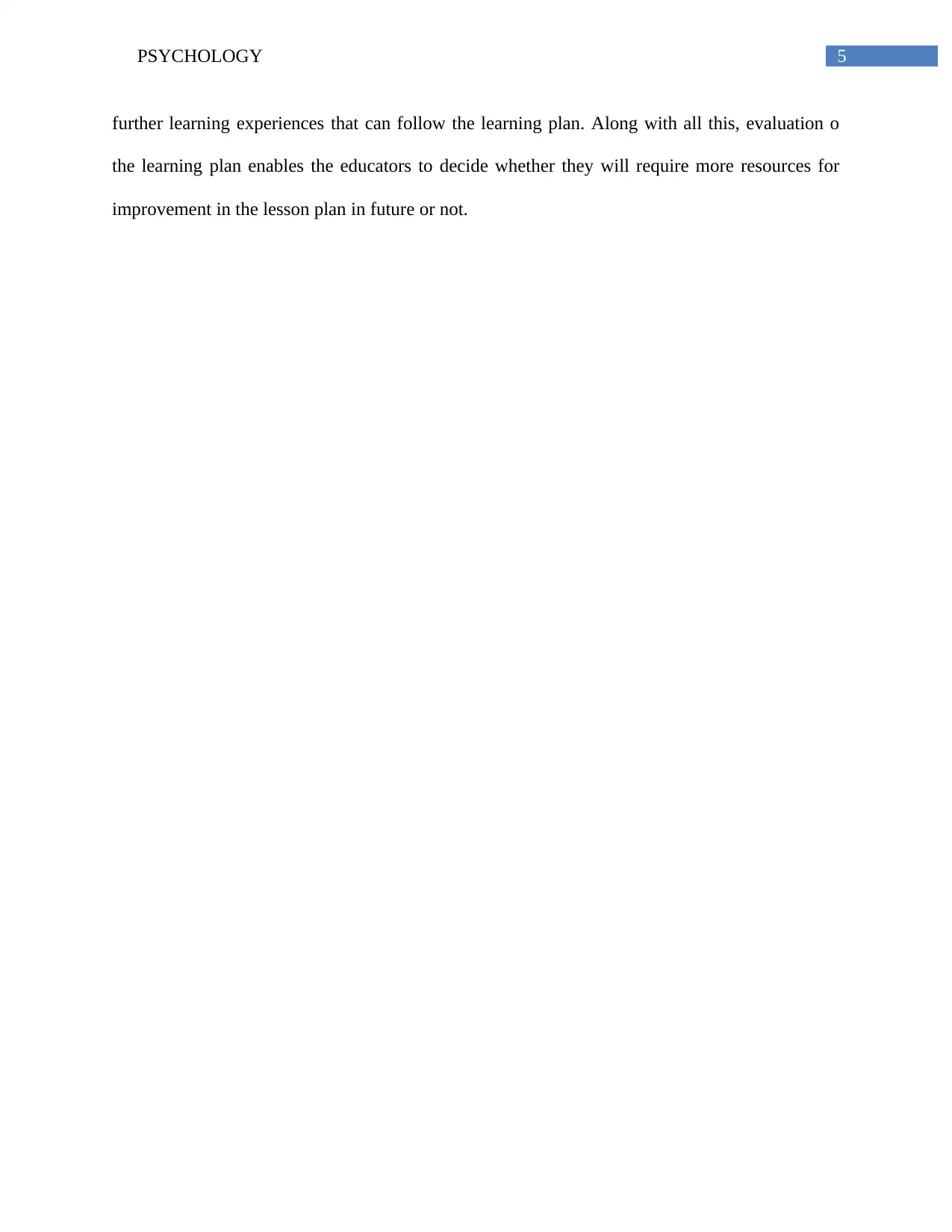
5PSYCHOLOGY
further learning experiences that can follow the learning plan. Along with all this, evaluation o
the learning plan enables the educators to decide whether they will require more resources for
improvement in the lesson plan in future or not.
further learning experiences that can follow the learning plan. Along with all this, evaluation o
the learning plan enables the educators to decide whether they will require more resources for
improvement in the lesson plan in future or not.
⊘ This is a preview!⊘
Do you want full access?
Subscribe today to unlock all pages.

Trusted by 1+ million students worldwide
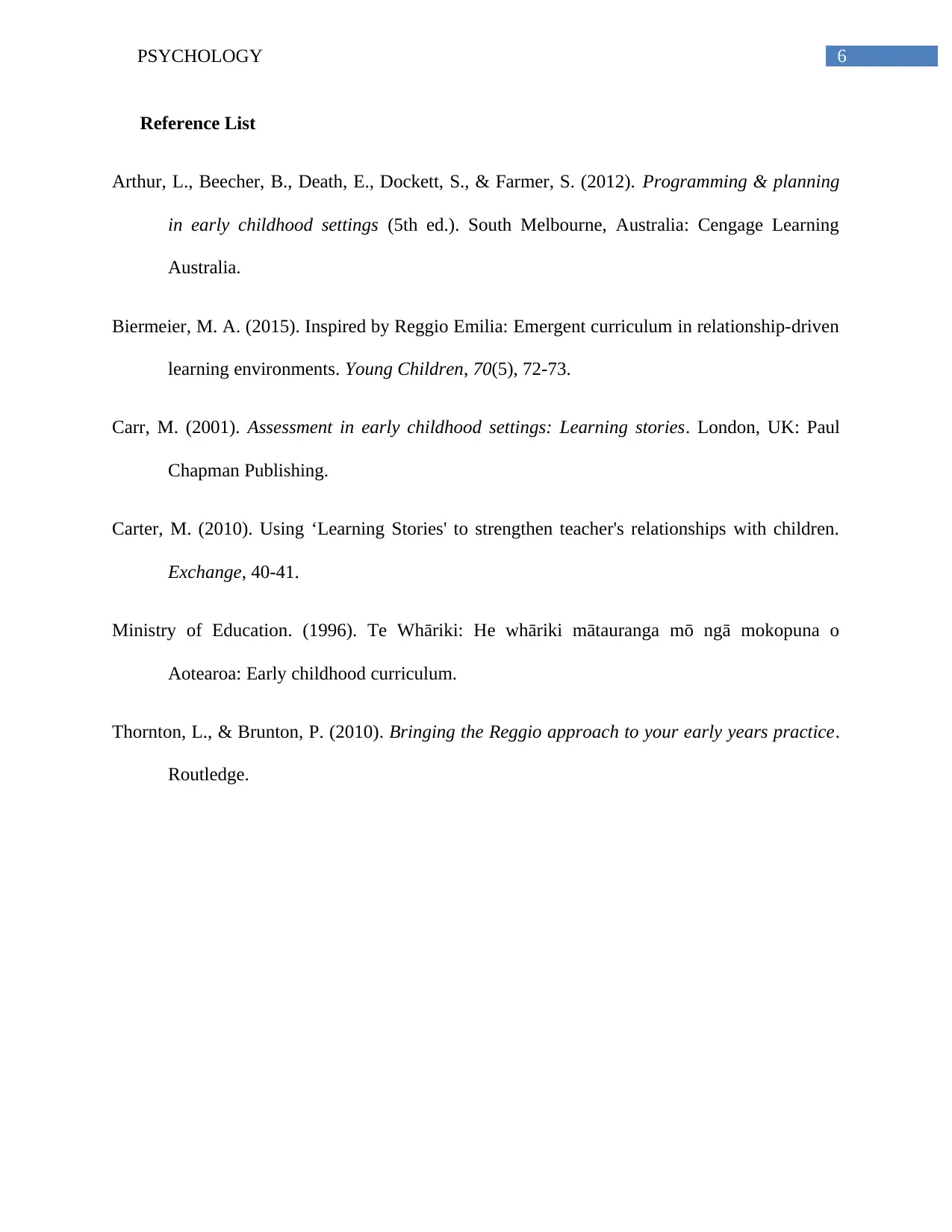
6PSYCHOLOGY
Reference List
Arthur, L., Beecher, B., Death, E., Dockett, S., & Farmer, S. (2012). Programming & planning
in early childhood settings (5th ed.). South Melbourne, Australia: Cengage Learning
Australia.
Biermeier, M. A. (2015). Inspired by Reggio Emilia: Emergent curriculum in relationship-driven
learning environments. Young Children, 70(5), 72-73.
Carr, M. (2001). Assessment in early childhood settings: Learning stories. London, UK: Paul
Chapman Publishing.
Carter, M. (2010). Using ‘Learning Stories' to strengthen teacher's relationships with children.
Exchange, 40-41.
Ministry of Education. (1996). Te Whāriki: He whāriki mātauranga mō ngā mokopuna o
Aotearoa: Early childhood curriculum.
Thornton, L., & Brunton, P. (2010). Bringing the Reggio approach to your early years practice.
Routledge.
Reference List
Arthur, L., Beecher, B., Death, E., Dockett, S., & Farmer, S. (2012). Programming & planning
in early childhood settings (5th ed.). South Melbourne, Australia: Cengage Learning
Australia.
Biermeier, M. A. (2015). Inspired by Reggio Emilia: Emergent curriculum in relationship-driven
learning environments. Young Children, 70(5), 72-73.
Carr, M. (2001). Assessment in early childhood settings: Learning stories. London, UK: Paul
Chapman Publishing.
Carter, M. (2010). Using ‘Learning Stories' to strengthen teacher's relationships with children.
Exchange, 40-41.
Ministry of Education. (1996). Te Whāriki: He whāriki mātauranga mō ngā mokopuna o
Aotearoa: Early childhood curriculum.
Thornton, L., & Brunton, P. (2010). Bringing the Reggio approach to your early years practice.
Routledge.
1 out of 7
Related Documents
Your All-in-One AI-Powered Toolkit for Academic Success.
+13062052269
info@desklib.com
Available 24*7 on WhatsApp / Email
![[object Object]](/_next/static/media/star-bottom.7253800d.svg)
Unlock your academic potential
Copyright © 2020–2026 A2Z Services. All Rights Reserved. Developed and managed by ZUCOL.





